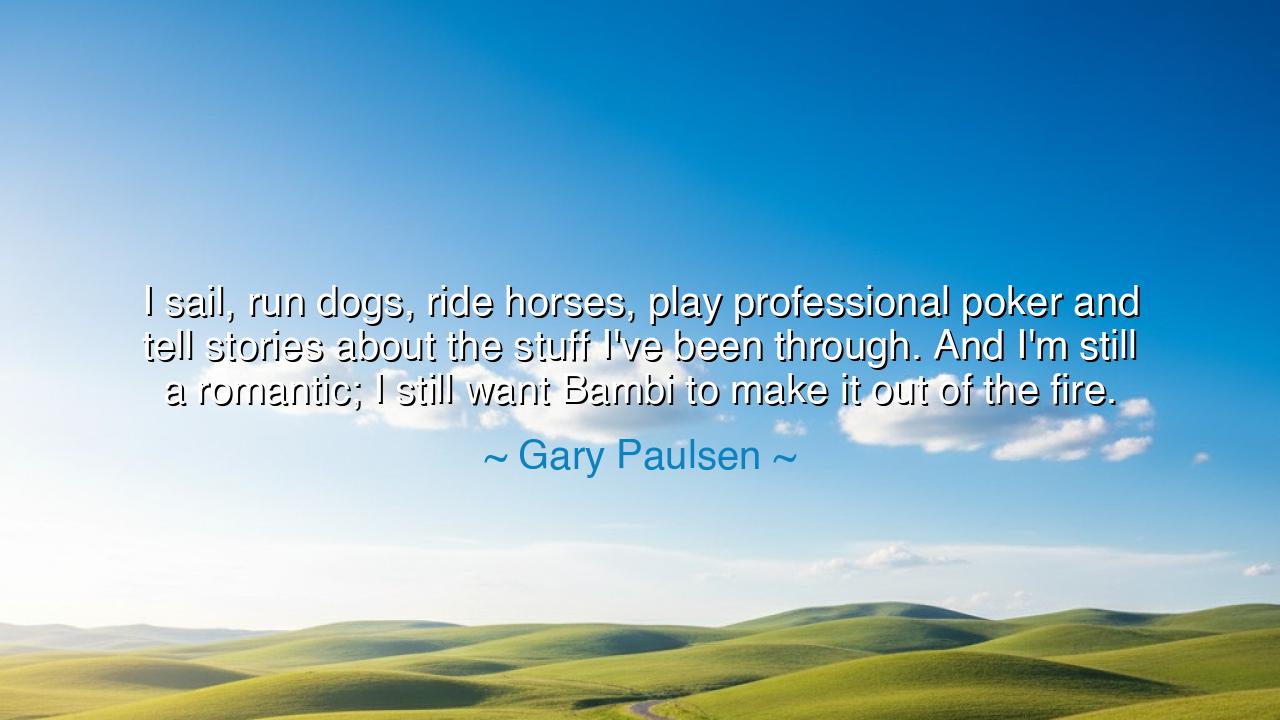
I sail, run dogs, ride horses, play professional poker and tell
I sail, run dogs, ride horses, play professional poker and tell stories about the stuff I've been through. And I'm still a romantic; I still want Bambi to make it out of the fire.






Hear the words of Gary Paulsen, a man who lived not only through pages but through wilderness itself: “I sail, run dogs, ride horses, play professional poker and tell stories about the stuff I’ve been through. And I’m still a romantic; I still want Bambi to make it out of the fire.” In this confession lies the essence of a rugged spirit softened by hope. It is the union of hardship and tenderness, of scars and dreams, of a life carved by storms yet still yearning for innocence.
Paulsen speaks first of his adventures—of sailing seas, of commanding sled dogs across frozen trails, of riding horses through the open country, of gambling in the unforgiving halls of poker, and of telling stories born from such experiences. These are the pursuits of a man who has tested himself against nature, against chance, against the unknown. He names himself as one hardened by trial. Yet even in the face of storms, both real and symbolic, he clings to the romantic spirit. For the truest test of strength is not only survival—it is the refusal to surrender wonder.
The image of Bambi, the fawn from a tale beloved by children, is not chosen lightly. In Paulsen’s words, Bambi becomes the symbol of innocence, of gentleness, of the fragile beauty that so often perishes in the flames of a harsh world. To say he still wants Bambi to make it out of the fire is to say: I still believe that goodness can endure, that innocence can be spared, that the gentle can survive in a brutal world. This yearning is deeply human—it is the refusal to allow cynicism to consume the heart, even when life has shown us its darkest corners.
History offers many such souls. Consider Ernest Shackleton, the Antarctic explorer, who led his men through the wreckage of the Endurance. Though surrounded by ice, hunger, and despair, he never lost his will to save every one of his crew. In the face of endless hardship, he remained not only a leader but a romantic, believing that survival was possible, that hope could outlast despair. Shackleton’s dream was not naïve—it was the very fuel that carried his men to life. So too with Paulsen: to keep wanting Bambi to survive is not childish, but heroic.
Paulsen’s life, like Shackleton’s, was full of trials. He knew poverty, war, solitude, and the wilderness in its merciless forms. And yet, from these ashes, he wrote books for children and young people—works like Hatchet—which breathed hope into generations. His belief that romance and innocence could still exist after fire was not a denial of reality, but an act of defiance against despair. To hope, after everything, is itself a warrior’s stance.
The meaning of his words is clear: though life will batter you, though you may sail storms, race across ice, gamble with fate, and suffer scars, never let the romantic heart die within you. Keep alive the part of you that longs for Bambi to escape, for innocence to endure, for kindness to survive. This is not weakness—it is strength beyond all others. For the cynic may survive, but only the romantic truly lives.
Therefore, children of tomorrow, take this lesson into your hearts: live boldly, test yourself, embrace hardship, but do not let hardship erase your wonder. Let the adventurer in you be strong, but let the romantic in you remain tender. Sail your seas, run your races, face your storms—but in the end, still hope that innocence survives the fire. For it is this hope that keeps humanity alive, generation after generation.
Thus Paulsen’s words, carved from a life of struggle and triumph, remind us: the world may be fire, but the heart can still be green. And so, even as we endure storms, let us always want Bambi to make it out.






AAdministratorAdministrator
Welcome, honored guests. Please leave a comment, we will respond soon